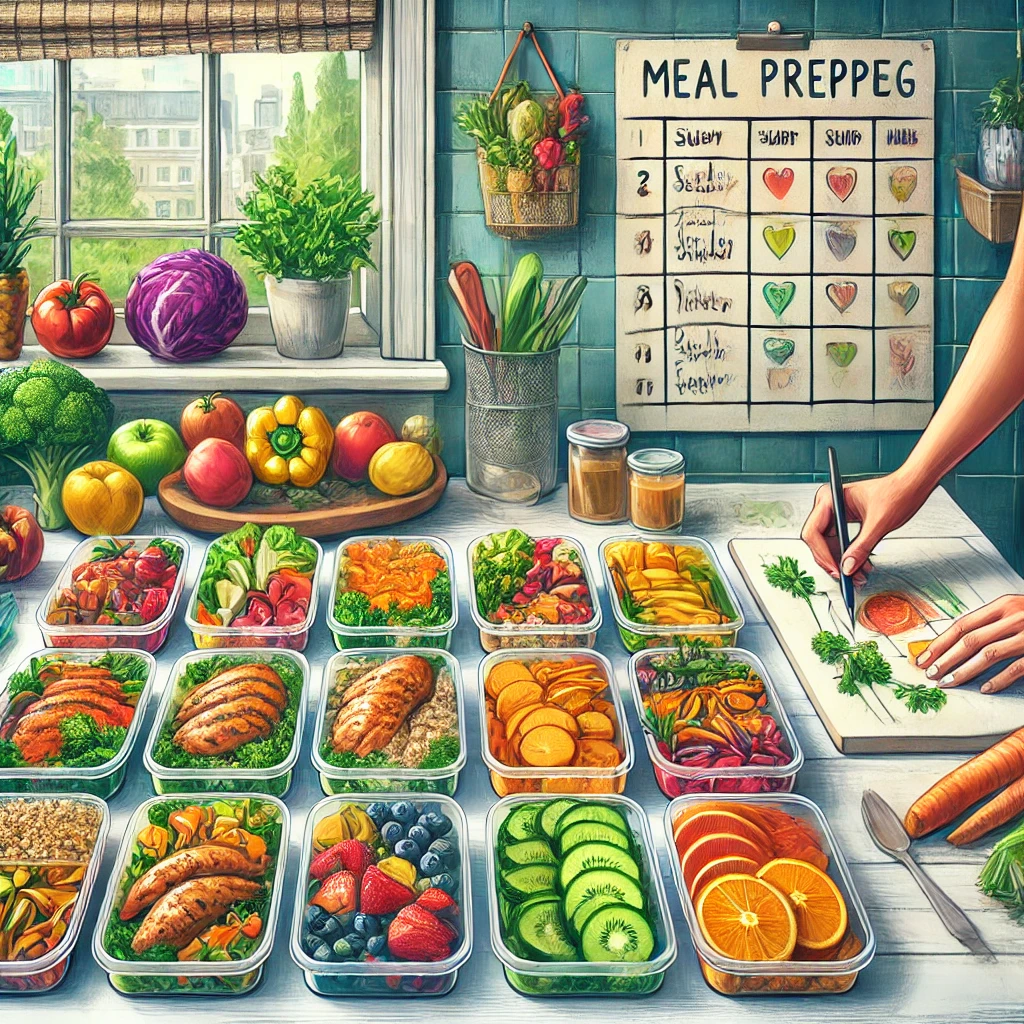Meal prepping has revolutionized the way busy people manage their diets, offering a practical solution to maintaining a healthy lifestyle while saving both time and money. By planning and preparing meals ahead of time, you can eat balanced and nutritious food throughout the week without the hassle of everyday cooking. Whether you’re experienced or new to meal prepping, mastering this skill can streamline your routine and help you achieve your health goals.
Here’s a detailed guide to help you get started, along with tips and strategies to make meal prepping work for you.
What is Meal Prepping?
Meal prepping involves preparing meals or ingredients in advance to simplify cooking and eating during the week. This can be anything from fully cooked meals stored in containers to pre-chopped ingredients ready for quick assembly.
Common Meal Prepping Approaches:
- Batch Cooking: Making large quantities of a single recipe (like chili or soup) to divide and store for the week.
- Ingredient Prep: Prepping ingredients like chopped vegetables, cooked grains, and portioned proteins to make meal assembly quicker.
- Full Meal Prep: Cooking and portioning entire meals into containers for easy grab-and-go options.
Benefits of Meal Prepping
- Saves Time: Reduces daily cooking by consolidating meal preparation into one or two sessions per week.
- Promotes Healthy Eating: Provides ready-to-eat, nutritious meals, helping you avoid unhealthy takeout.
- Minimizes Food Waste: Plans ahead to use ingredients efficiently.
- Saves Money: Decreases impulse buying and reduces reliance on expensive prepared foods.
- Reduces Stress: Eliminates the daily question of “What’s for dinner?” by having meals ready.
Steps to Start Meal Prepping
1. Plan Your Meals
Create a meal plan that matches your dietary needs, schedule, and nutritional goals.
How to Plan:
- Determine the number of meals and snacks you need for the week.
- Choose recipes with overlapping ingredients to save time and reduce waste.
- Ensure a mix of proteins, vegetables, whole grains, and healthy fats.
Example Meal Plan:
- Breakfast: Overnight oats with berries.
- Lunch: Grilled chicken salad with quinoa.
- Dinner: Stir-fried tofu with vegetables and brown rice.
- Snacks: Hard-boiled eggs, hummus with veggie sticks, and yogurt with granola.
2. Make a Grocery List
Based on your meal plan, create a detailed grocery list to make sure you have everything you need.
Tips:
- Check your pantry and fridge for items you already have.
- Buy fresh produce in season for better flavor and cost savings.
- Use bulk bins for grains, nuts, and seeds to save money.
3. Set Aside Time for Prep
Dedicate a few hours on a specific day (like Sunday) to prepare your meals or ingredients.
Efficient Workflow:
- Start with items that take the longest to cook, such as grains or proteins.
- Chop vegetables while other items are cooking.
- Use multiple cooking methods simultaneously (bake, boil, and sauté).
4. Invest in Quality Containers
Good storage containers are essential for keeping your meals fresh and organized.
Recommended Containers:
- Glass containers for reheating in the oven or microwave.
- BPA-free plastic containers for lightweight portability.
- Mason jars for salads or smoothies.
5. Store and Label Meals
Proper storage and labeling ensure freshness and variety throughout the week.
Storage Tips:
- Use airtight containers to maintain freshness.
- Store meals for up to 4-5 days in the fridge or freeze for longer shelf life.
- Label containers with the meal name and date prepared.
Tips for Successful Meal Prepping
1. Keep It Simple
Start with basic recipes and gradually experiment with new dishes as you become more comfortable.
2. Incorporate Variety
Avoid boredom by mixing up flavors, cuisines, and textures. For example, rotate between Mediterranean, Asian, and Mexican-inspired meals.
By following these steps and tips, you can make meal prepping an effective and enjoyable part of your weekly routine. Focus on a Balanced Diet Make sure each meal has protein, complex carbs, healthy fats, and lots of veggies.
Enhance Flavor with Spices and Sauces
Use herbs, spices, and homemade dressings to add taste.
Quick Sauce Ideas:
- Lemon-tahini dressing
- Peanut satay sauce
- Herb pesto
Cook Extra Portions
Prepare extra servings of meals that freeze well, like soups, stews, or casseroles for busy times.
Common Challenges and Solutions
Challenge 1: Lack of Time
- Solution: Start by prepping one or two meals each week.
Challenge 2: Food Spoiling
- Solution: Store meals correctly and eat perishable items earlier in the week.
Challenge 3: Getting Bored
- Solution: Plan for variety and change recipes often.
Meal Prepping for Special Diets
Vegetarian/Vegan:
- Use plant-based proteins like tofu, tempeh, lentils, and chickpeas.
- Include many fresh vegetables and whole grains.
Keto:
- Make high-fat, low-carb meals like grilled salmon with spinach or egg muffins.
Gluten-Free:
- Use grains like quinoa, rice, and polenta that are naturally gluten-free.
Recipe Ideas for Meal Prepping
- Breakfast: Veggie Egg Muffins
- Mix eggs with chopped vegetables and pour into a muffin tin.
- Bake and store in the fridge for a quick breakfast.
- Lunch: Mason Jar Salads
- Layer dressing, grains, protein, and greens in a jar.
- Shake and eat when ready.
- Dinner: Sheet Pan Chicken and Vegetables
- Roast chicken and mixed vegetables with olive oil and seasoning on a sheet pan.
- Divide into containers with quinoa or rice.
Final Thoughts
Meal prepping helps save time, eat healthier, and reduce daily stress. By planning, you can prepare a week’s worth of tasty and nutritious meals fitting your lifestyle and dietary needs. Whether for yourself or your family, this practice simplifies your routine and helps you stay on track with your goals.
Start with small steps, stay organized, and let meal prepping change your approach to food and nutrition. With a bit of effort upfront, you’ll enjoy the benefits all week long!

